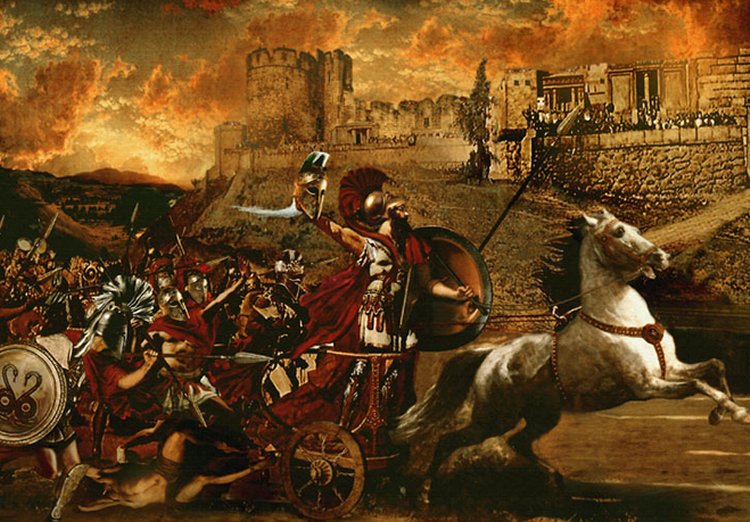Achilles – Son Of King Peleus And Leader Of The Nereids
A. Sutherland - AncientPages.com - The epic poem, The Iliad, was written by Homer sometime in the 8th century BC. It recounts some of the most important events of the final weeks of the Trojan War and the Greek siege of the city of Troy.
Achilles Triumphant (The Iliad) illustration by Howard David Johnson.
One of the central figures of the epic is Achilles, who traveled to Troy to bring Helen back to her husband, King Menelaus of Sparta, Agamemnon's younger brother. Achilles was the son of King Peleus of the Myrmidons and Thetis, the leader of the 50 Nereids.
Both Zeus and Poseidon desired the beautiful sea goddess but were warned by the Titan Prometheus that any male child born to her would become more significant than his father. As such, both the brothers ceased pursuing her and convinced Peleus to marry her instead.
When Achilles was born, Thetis wanted to gift him immortality. She took him to the Underworld and, holding him by the ankle, dipped him in the waters of the River Styx. However, she was unaware that the only dead spot on his entire body was the one ankle she had held when she submerged him in the river.
Another version tells that to make Achilles immortal, she smothered his body with ambrosia and then placed him on top of a fire to burn away the mortal part of his body. As she was doing this, however, Peleus interrupted her, and enraged, she left them both with the process unfinished.
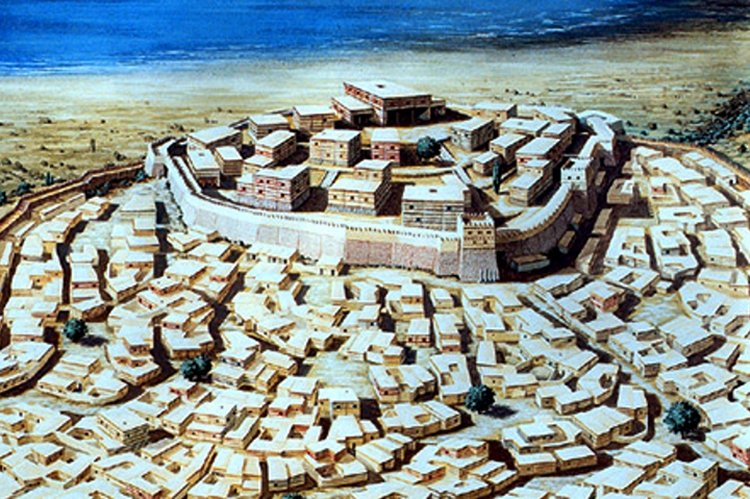 Reconstruction of Troy VIh/VIi (Wilusa of the Hittite text. Credits: Copyright by Christoph Haussner Munich
Reconstruction of Troy VIh/VIi (Wilusa of the Hittite text. Credits: Copyright by Christoph Haussner Munich
When the Trojan War began, Achilles was given the command of fifty ships, each containing 50 men. He engaged the services of five commanders-in-chief - Menesthius, Eudorus, Peisander, Phoenix, and Alcimedon. After they set sail for Troy, they accidentally landed in Mysia, where King Telephus ruled.
Telephus went to Achilles and was healed in exchange for directions to Troy.
A fight broke out with Achilles wounding Telephus, but the injury wouldn't heal, so Telephus consulted an oracle. He was told that only the person who caused the wound would be able to cure it.
The Iliad begins the narrative of the Trojan War when King Agamemnon attained a woman named Chryseis and enslaved her. Her father was a priest of the god Apollo, and she pleaded with him to aid his cause. Upon hearing this, Apollo sends a plague to curse the Greeks. Calchas informs Agamemnon of what caused this curse.
Reluctantly, Agamemnon agrees to give up Chryseis but only on the condition that Achilles hands his woman Briseis over to him. Achilles is outraged at the lack of respect and withdraws from the battle.
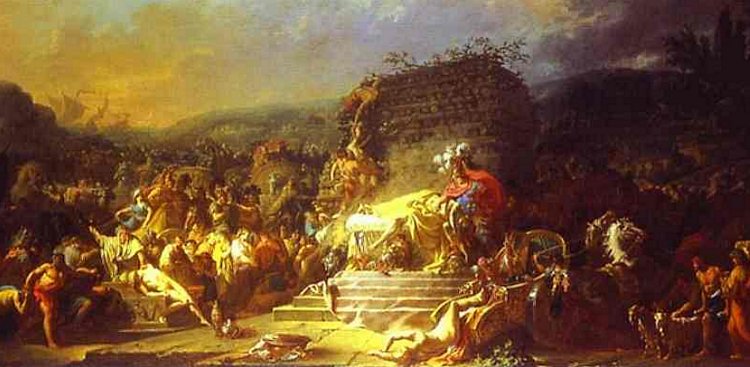 The Funeral of Patroclus - Jacques-Louis David
The Funeral of Patroclus - Jacques-Louis David
He visits with his mother, Thetis, and convinces her to ask Zeus to aid the Trojans so that he may demonstrate his worth in action once more. After this, the Trojans can push the Greeks back to shore.
Here, Patroclus, the friend of Achilles, puts on his armor without him knowing and commands the Myrmidons in a battle against the Trojans. However, he is slain by Hector, one of King Priam's sons. Achilles is enraged at Patroculus's death; he rejoins the Greeks on the battlefield and kills Hector. Subsequently, he ties Hector's body to his chariot throughout the funeral games held for his friend. As he lies about dying, Hector tells of how Achilles will die.
Hector's brother, Paris, shoots at the Greek hero, and the poisoned arrow lands in Achilles' one dead spot – his ankle.
According to other accounts, Apollo guided the arrow toward the Achilles heel. After Troy had fallen to the Greeks, his body was cremated and merged with the ashes of Patroclus.
Written by – A. Sutherland AncientPages.com Staff Writer
Updated on October 18, 2022
Copyright © AncientPages.com All rights reserved. This material may not be published, broadcast, rewritten or redistributed in whole or part without the express written permission of AncientPages.com
Expand for referencesSpara
Spara
More From Ancient Pages
-
 Ethical Ancient DNA Research Must Involve Descendant Communities – Researchers Say
Archaeology | Jan 13, 2023
Ethical Ancient DNA Research Must Involve Descendant Communities – Researchers Say
Archaeology | Jan 13, 2023 -
 Giant Pre-Hispanic Jar Used To Make Mexican Traditional Corn Beer
Archaeology | May 6, 2020
Giant Pre-Hispanic Jar Used To Make Mexican Traditional Corn Beer
Archaeology | May 6, 2020 -
 Meet SPOT – Robot Dog Deployed To Guard The Ancient Ruins Of Pompeii
News | Apr 1, 2022
Meet SPOT – Robot Dog Deployed To Guard The Ancient Ruins Of Pompeii
News | Apr 1, 2022 -
 Rhetorica ad Herennium: Ancient Book That Improves Your Memory Using Method Of Loci – You Can Test It Easily
Featured Stories | Nov 13, 2023
Rhetorica ad Herennium: Ancient Book That Improves Your Memory Using Method Of Loci – You Can Test It Easily
Featured Stories | Nov 13, 2023 -
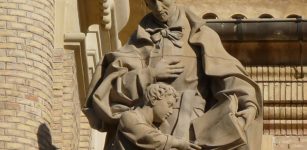 On This Day In History: First Public And Free School Opened For Poor Children – On Sep 15, 1616
News | Sep 15, 2016
On This Day In History: First Public And Free School Opened For Poor Children – On Sep 15, 1616
News | Sep 15, 2016 -
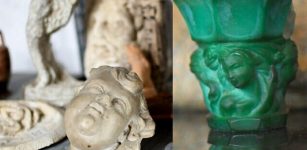 Thousands Of Spectacular Stolen Ancient Treasures Discovered Hidden In Major Bust
Artifacts | Jan 5, 2021
Thousands Of Spectacular Stolen Ancient Treasures Discovered Hidden In Major Bust
Artifacts | Jan 5, 2021 -
 On This Day In History: Simon Fraser – The Last Man In Britain To Be Executed On Tower Green, London – On Apr 9, 1747
News | Apr 9, 2017
On This Day In History: Simon Fraser – The Last Man In Britain To Be Executed On Tower Green, London – On Apr 9, 1747
News | Apr 9, 2017 -
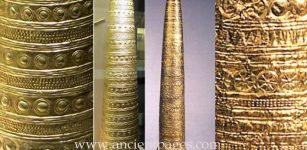 Mystery Of 3,000-Year-Old Conical Hats – Was It A Highly Advanced Device?
Artifacts | Jun 20, 2020
Mystery Of 3,000-Year-Old Conical Hats – Was It A Highly Advanced Device?
Artifacts | Jun 20, 2020 -
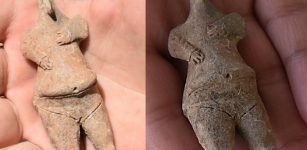 7,800-Year-Old Clay Female Figurine Unearthed In Ulucak Mound, Turkey’s Izmir
Archaeology | Aug 17, 2022
7,800-Year-Old Clay Female Figurine Unearthed In Ulucak Mound, Turkey’s Izmir
Archaeology | Aug 17, 2022 -
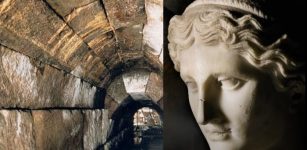 Venus Cloacina: Roman Goddess Of Sewers And Drains
Featured Stories | Dec 19, 2019
Venus Cloacina: Roman Goddess Of Sewers And Drains
Featured Stories | Dec 19, 2019 -
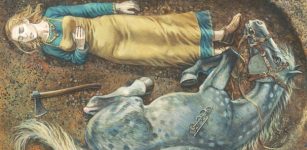 Vikings Cared Deeply For Their Animal Companions – Shared Human And Horse Burials Reveal
Featured Stories | Aug 3, 2023
Vikings Cared Deeply For Their Animal Companions – Shared Human And Horse Burials Reveal
Featured Stories | Aug 3, 2023 -
 New Study Sheds Light On The Phenomenon Of Female Jewish Slavery And Uncovers Gang Rape In Livorno’s Slave Prison
Archaeology | May 18, 2022
New Study Sheds Light On The Phenomenon Of Female Jewish Slavery And Uncovers Gang Rape In Livorno’s Slave Prison
Archaeology | May 18, 2022 -
 Surprising Evidence Of Prehistoric Human Activity In Falkland Islands – Europeans Were Not The First Settlers
Archaeology | Oct 29, 2021
Surprising Evidence Of Prehistoric Human Activity In Falkland Islands – Europeans Were Not The First Settlers
Archaeology | Oct 29, 2021 -
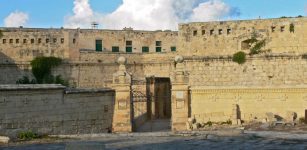 On This Day In History: Maltese Rebellion Took Place – On Sep 8, 1775
News | Sep 8, 2016
On This Day In History: Maltese Rebellion Took Place – On Sep 8, 1775
News | Sep 8, 2016 -
 Warming Of North Pacific Helped First Human Migration From Asia To North America
Archaeology | Dec 15, 2020
Warming Of North Pacific Helped First Human Migration From Asia To North America
Archaeology | Dec 15, 2020 -
 Unique Over 1,000-Year-Old ‘Telephone’ Invented By A Lost Forgotten Civilization With No Written Language
Civilizations | Aug 24, 2018
Unique Over 1,000-Year-Old ‘Telephone’ Invented By A Lost Forgotten Civilization With No Written Language
Civilizations | Aug 24, 2018 -
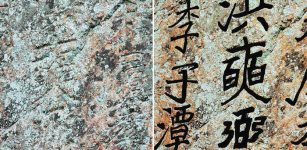 Ancient Graffiti On Sacred Mountain Reveals Secrets Of North Korea
Archaeology | Dec 3, 2021
Ancient Graffiti On Sacred Mountain Reveals Secrets Of North Korea
Archaeology | Dec 3, 2021 -
 Olduvai Gorge: Direct Cosmogenic Nuclide Dating Of Olduvai Lithic Industry
News | Mar 31, 2022
Olduvai Gorge: Direct Cosmogenic Nuclide Dating Of Olduvai Lithic Industry
News | Mar 31, 2022 -
 Beethoven’s Genome Offers Clues To Composer’s Health And Family History
DNA | Mar 27, 2023
Beethoven’s Genome Offers Clues To Composer’s Health And Family History
DNA | Mar 27, 2023 -
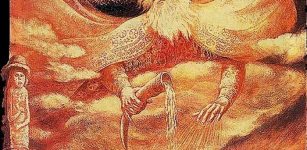 Secrets Of The ‘Worlds Of Prav, Nav And Yav’ Revealed – Ancient Slavic Wisdom Confirms The Multiverse Theory
Featured Stories | Oct 6, 2015
Secrets Of The ‘Worlds Of Prav, Nav And Yav’ Revealed – Ancient Slavic Wisdom Confirms The Multiverse Theory
Featured Stories | Oct 6, 2015

